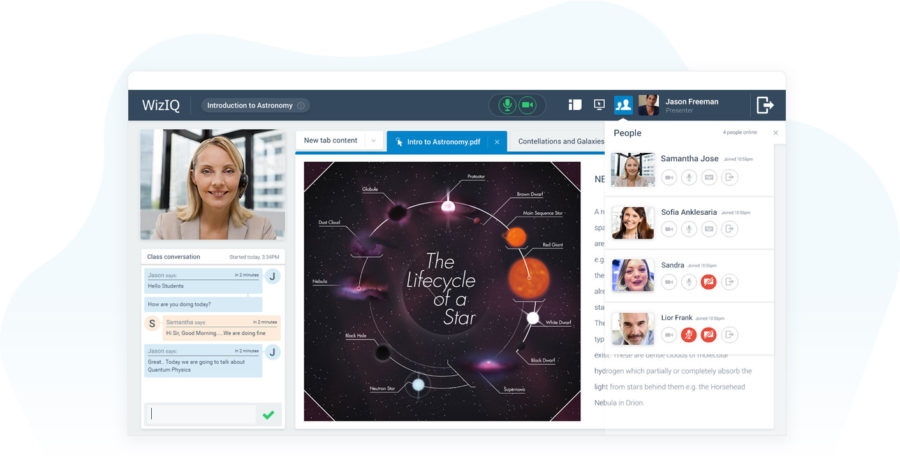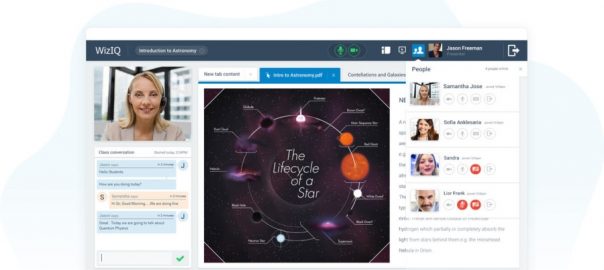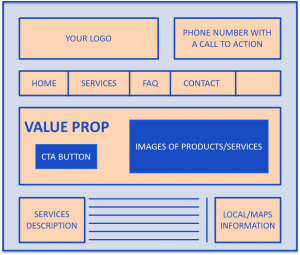— September 18, 2017
In today’s day and age, people spend a significant portion of their time online, creating a modern environment where there is a noticeable demand for online courses.
These offer significant advantages over conventional teaching methods, including increased flexibility and lower associated costs, and from the teacher’s perspective provide a fantastic opportunity to generate an impressive income.

Virtual Classroom / WizIQ
There are various teachers online who are making an absolute killing from offering online courses, including John Lee Dumas who earned a staggering $ 490,641 in the month of April alone, and Pat Flynn who earned $ 176,619.
Successful course curators are living proof of the thriving nature of online education, which are a realistic earner once developed, and there is considerable anecdotal evidence online that suggests people can receive their main income from online courses.
If you’re thinking of establishing your own course, there are three main questions you need to ask yourself:
- What separates your idea and delivery from the competition?
- How can you become profitable through your venture?
- How will your course help you build an influence online?
Online courses are argued as the ‘perfect product’, with particular reference to helping people through a passive, scalable, and impactful learning method.
Whether you decide to dedicate all of your time to building online courses, or engage in this a part time venture, deciding on a profitable topic is probably the most difficult part of the process, and for this reason, throughout this article I will provide motivation and guidance to help you on your quest.
Extracting a good idea from your brain can be a stumbling block, but if you can revert and regress back to your former self, this can give an enhanced perspective on what you needed to learn, and how you learned it. This line of thought can be channeled into the creation of your course.
Cultivating your concept can be a lengthy process, meaning persistence is of critical importance for success. Your idea may not come to you straight away, but during the brain mapping stage it’s important to keep your customer in mind, and focus on addressing a specific consumer demand. What your customer needs and wants is most important, utilizing a creative strategy with a patient and reliable methodology.
It is important to base your approach on other successful models, using quantitative measures to come up with a profitable idea. This can help you discover your niche, which can stem beyond the conventionality of developing B2B courses to make a full time income. There are countless examples of success stories from individuals who sell courses about their own hobbies, which become impactful in relation to the authenticity of the content. Value comes in many shapes and forms, so be certain not to dismiss an idea because you think it won’t be well received. If you can see value in the content and will have learned from it prior to gaining the knowledge yourself, the chances are there are various people out there who can benefit from your course.

OpenClipart-Vectors / Pixabay
Courses are often launched through your own blog, so it is important for the topic to be aligned with your teachings. This way you can stay on track with your target audience in mind, but if you don’t have a blog all is not lost, since it is helpful but not absolutely necessary. Remember to create a course with a specific person in mind, as opposed to creating a generic course for ‘everyone’. It should be results based, addressing a problem that people have and offering a solution. Tapping into the pains and frustrations of your audience can help individuals alleviate their issues, and targeting a specific consumer base that isn’t too specific will help you on route to lucrativity.
There are numerous considerations during curation, such as whether you want to capitalize on high end coaching (premium price, small audience) or mass market (low price, huge audience). The former is arguably more effective because you don’t have to sell too much to make money, but the best of both worlds approach is the ‘Unicorn’. This mythical and highly profitable venture relates to a high priced course with a large audience, and though this is difficult to come up with, it will more than likely appeal to a diverse range of individuals. When people see you have developed an idea specifically for them, they will connect with it instantly, another reason for honing in on specific courses.
Convergence, combining two are more topics to create something unique, is a keyword during development, alongside synthesis, which focuses on adding an audience to the mix, helping you determine your niche. For example, if you want to develop a course on social media, this is far too broad and is unlikely to relate to users, but with convergence you can convert this to ‘Social Media for Business Owners’, if this fits your niche, and with synthesis further narrow it down to ‘Social Media for Yoga Instructors’, for example. Don’t be afraid of alienating people, because the bespoke nature of your course will become its main selling point.
As aforementioned, try to base your course on your own transformation. Sharing something you have achieved yourself helps you sell a believable journey, basing the course on your own results to create teachable lessons. Your product should bridge the gap between students and customers, and this is aided by paying attention to what people want. Being observant goes a long way, and with the right passion and researching abilities you can decipher what people desire using forums, your competitors as a barometer, Amazon eBooks, and comments on blog posts.
If you own a blog, look back to see which posts were most popular, which can provide inspiration to proceed. You don’t have to be an expert to teach efficiently, just being a few steps ahead of beginners is sufficient. People want to buy courses from someone they trust, and someone who is using the skills they need in ways similar to their situation. People will crave your unique teaching methods, and the following questions interlinking with your blog will help your quest greatly:
- What are your customers questions and issues?
- What do they seek?
- Why do they come to your blog?
- What are they frustrated with?
- How can you help them reach their goals?
Your quirks are ultimately what will make your product stand out, and though emulating the success of others is good for inspiration, it’s your individuality that will help your product stand out. If you’re doing things differently from others, your personal spin on an idea becomes your unique selling point, helping you create a product which is a reflection of your achievement, a transformation you’ve experienced, or a sharing of skills you have learned with your target audience.
Every blogger has something to share – why else would they have a blog? Take your experience, your knowledge, your expertise, and start earning! I hope this article has demonstrated just how much money can be made from building your own online course.
Now you know how to find a profitable course topic, the rest in your hands, so, go forth, and create!
Digital & Social Articles on Business 2 Community
(80)








